Unit 4 body language reading [下学期]
文档属性
| 名称 | Unit 4 body language reading [下学期] | 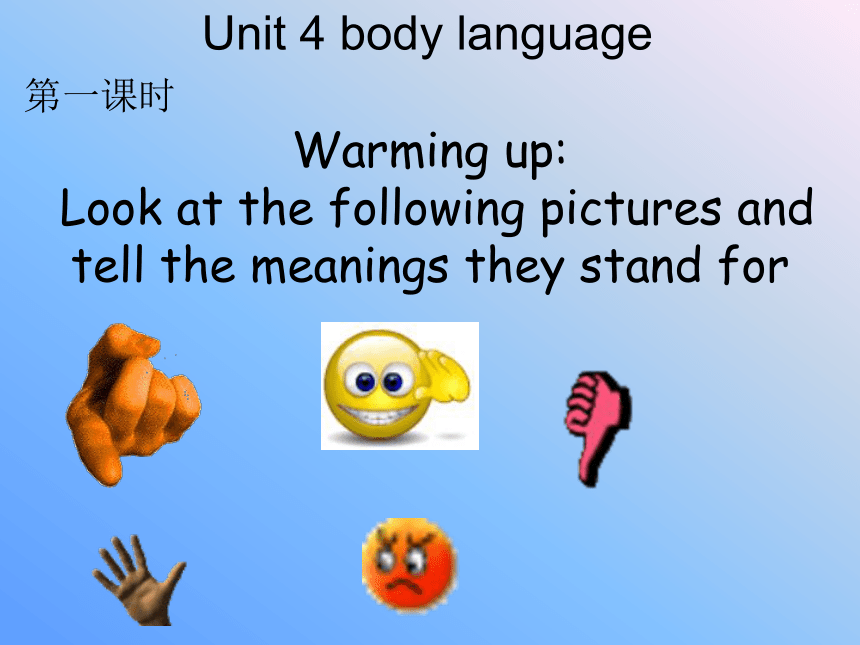 | |
| 格式 | rar | ||
| 文件大小 | 456.3KB | ||
| 资源类型 | 教案 | ||
| 版本资源 | 人教版(新课程标准) | ||
| 科目 | 英语 | ||
| 更新时间 | 2006-08-09 13:08:00 | ||
图片预览

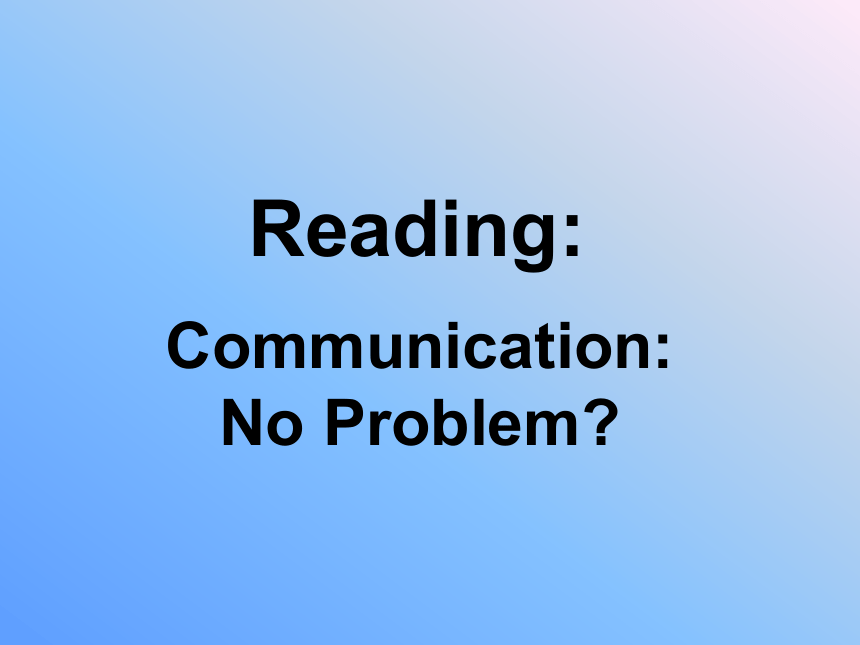
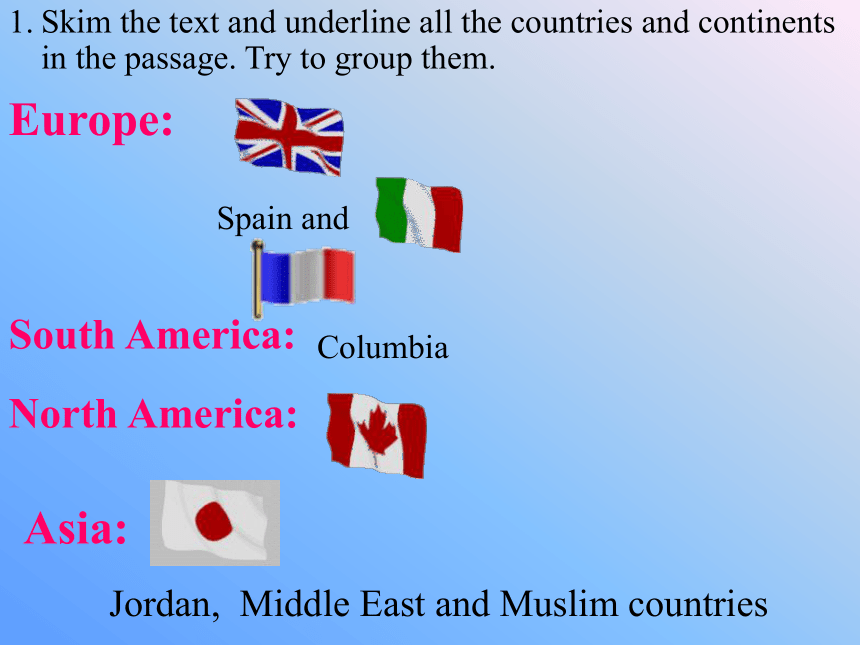
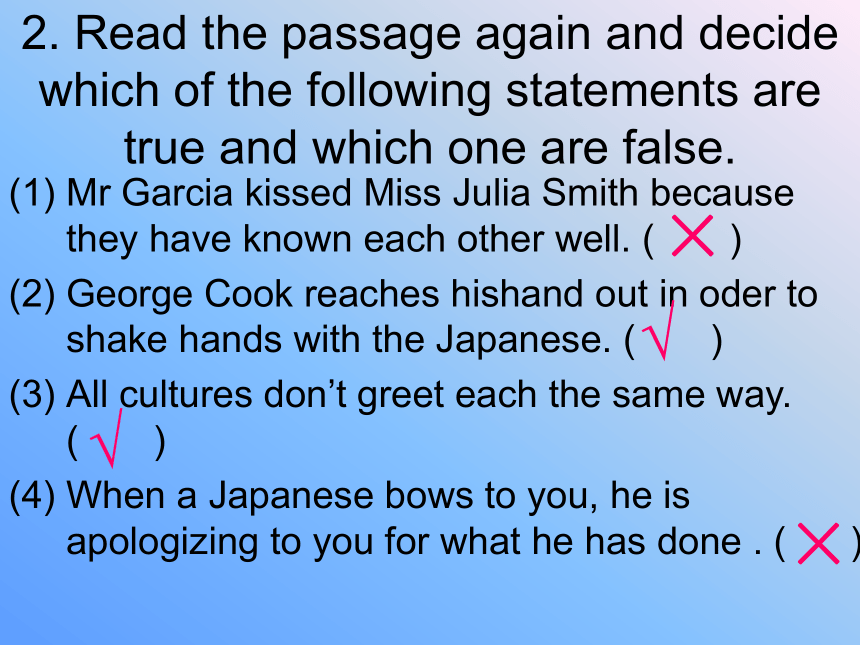
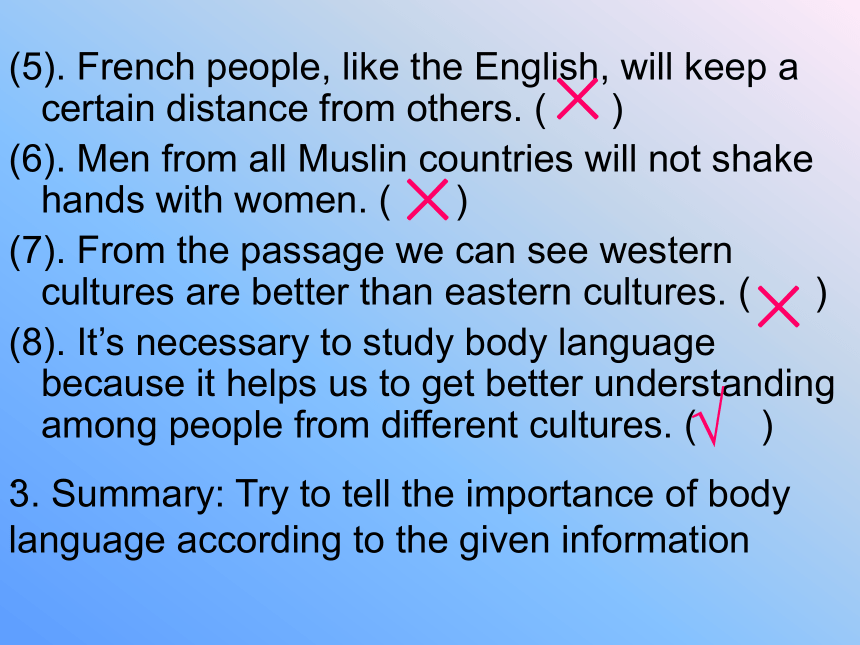
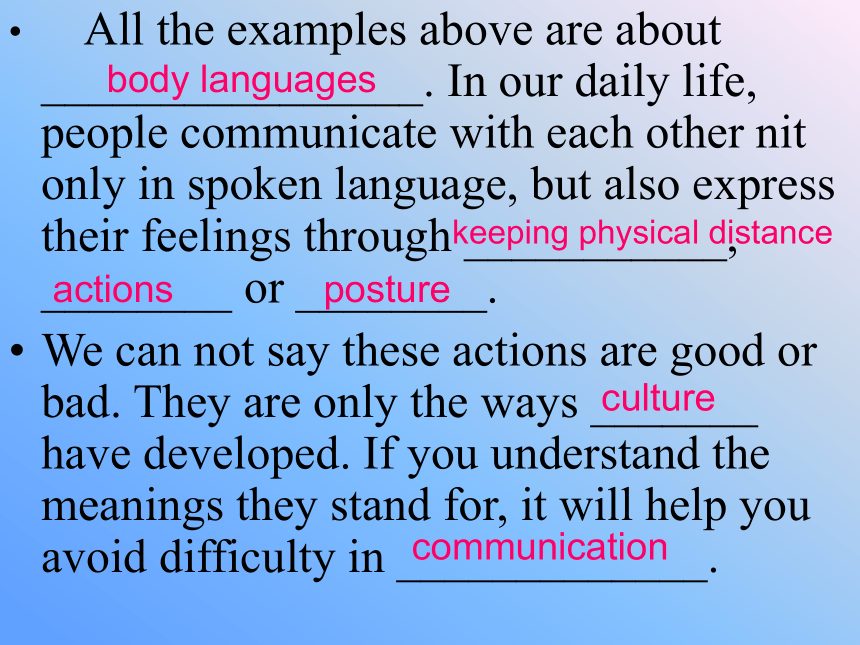
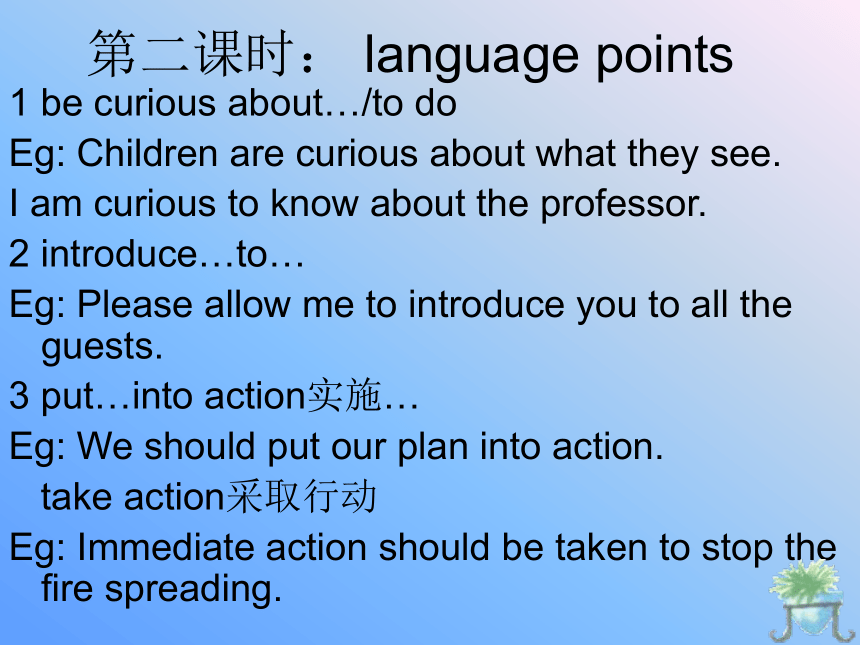
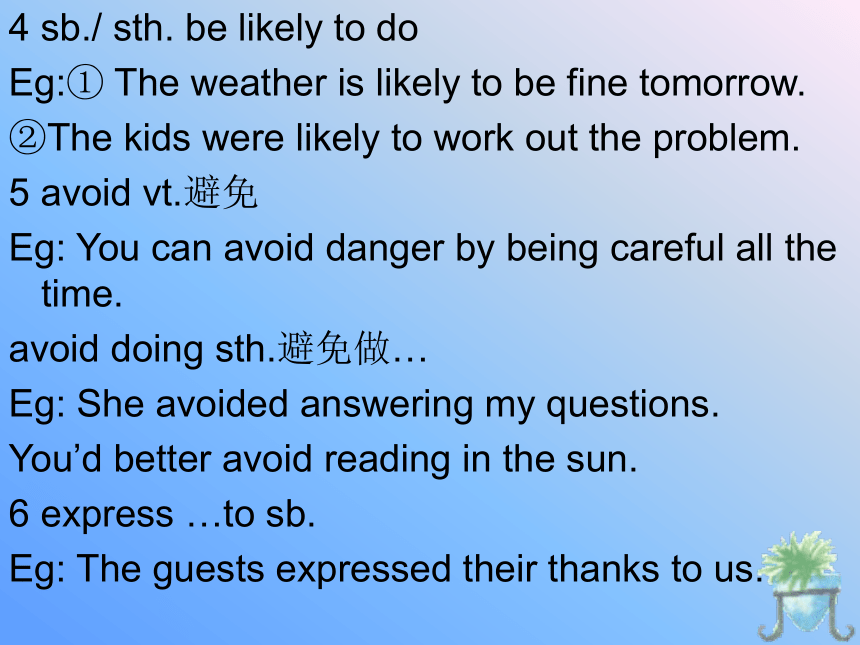
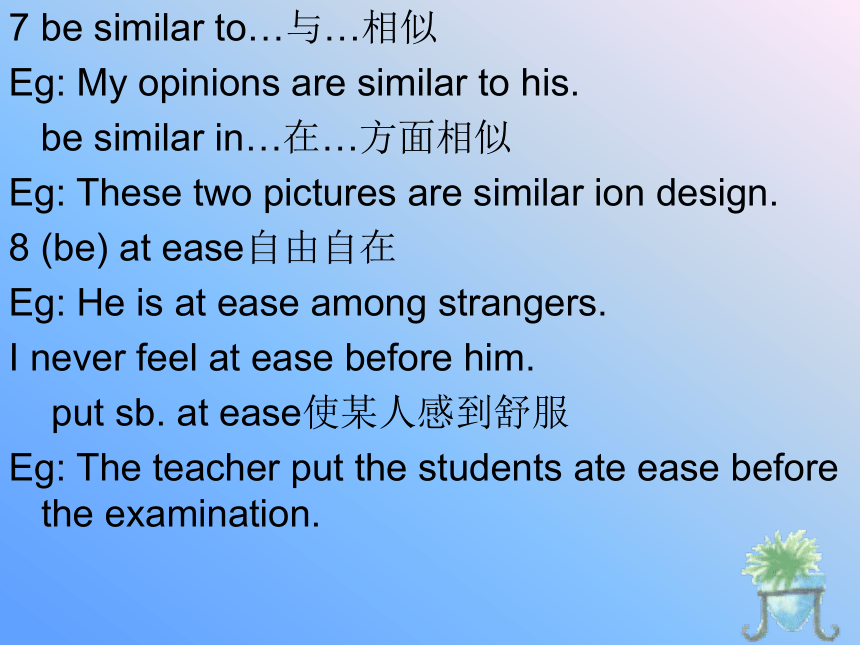
文档简介
课件20张PPT。Warming up: Look at the following pictures and tell the meanings they stand forUnit 4 body language第一课时Reading:Communication: No Problem?Skim the text and underline all the countries and continents in the passage. Try to group them.Europe:Spain andAsia:Jordan, Middle East and Muslim countriesSouth America:ColumbiaNorth America:2. Read the passage again and decide which of the following statements are true and which one are false.Mr Garcia kissed Miss Julia Smith because they have known each other well. ( )
(2) George Cook reaches hishand out in oder to shake hands with the Japanese. ( )
(3) All cultures don’t greet each the same way. ( )
(4) When a Japanese bows to you, he is apologizing to you for what he has done . ( )
××√√(5). French people, like the English, will keep a certain distance from others. ( )
(6). Men from all Muslin countries will not shake hands with women. ( )
(7). From the passage we can see western cultures are better than eastern cultures. ( )
(8). It’s necessary to study body language because it helps us to get better understanding among people from different cultures. ( )
.×××√3. Summary: Try to tell the importance of body
language according to the given information All the examples above are about ________________. In our daily life, people communicate with each other nit only in spoken language, but also express their feelings through ___________, ________ or ________.
We can not say these actions are good or bad. They are only the ways _______ have developed. If you understand the meanings they stand for, it will help you avoid difficulty in _____________.body languageskeeping physical distanceactionspostureculturecommunication第二课时: language points1 be curious about…/to do
Eg: Children are curious about what they see.
I am curious to know about the professor.
2 introduce…to…
Eg: Please allow me to introduce you to all the guests.
3 put…into action实施…
Eg: We should put our plan into action.
take action采取行动
Eg: Immediate action should be taken to stop the fire spreading.4 sb./ sth. be likely to do
Eg:① The weather is likely to be fine tomorrow.
②The kids were likely to work out the problem.
5 avoid vt.避免
Eg: You can avoid danger by being careful all the time.
avoid doing sth.避免做…
Eg: She avoided answering my questions.
You’d better avoid reading in the sun.
6 express …to sb.
Eg: The guests expressed their thanks to us.
7 be similar to…与…相似
Eg: My opinions are similar to his.
be similar in…在…方面相似
Eg: These two pictures are similar ion design.
8 (be) at ease自由自在
Eg: He is at ease among strangers.
I never feel at ease before him.
put sb. at ease使某人感到舒服
Eg: The teacher put the students ate ease before the examination.
9 show one’s respect (n.) for…=respect (vt.) (sb.)
Eg: We should show our respect for the old in our daily life.
=We should respect the old in our daily life.
10 punish sb. for (doing) sth.
Eg: She punished her son for telling a lie.
He was punished for his carelessness.Showing our feelingsRead the text and summarize the main idea.
the similarities and differences of some body languages第三课时 & turn your back
angry
2. close your hand & shake it :
→threaten
3. put people at easehide feelings4.
→agreement
5.
→disagree or refuse
6. Look away or
→not interested
7. stand, arms across your chest
→protection8.
9.
10. Show respect: (to boss or teacher)
DON’TS:→interested→do not believe/ like×difference look directly
at each otherNot a good behavior
in Asian and South American countriesdo not look in the eye→do not tell the truth→punished
In North America第四课时:Grammar v.-ing form as adverbial
做时间状语
Eg: Be careful (when) crossing the street.
Don’t mention this when talking to him.
2. 做原因状语
Eg: Being ill, she didn’t go to work.
Not knowing her address, we couldn’t get in touch with her.
3. 做结果状语
Her husband died, leaving her with two children.4. 做方式状语或伴随状语
Eg: She ran out of the classroom, crying.
Tom stood at the school gate waiting for Jack.
注意v.-ing form 的否定形式:Not doing
Eg: Not having breakfast, he felt very hungry only at 9 in the morning.
典型例题:
1. He sent me an E-mail, ______ to get further information.
hoped B. hoping
C. to hope D. hoped
√2. Finding her car stolen, __________.
a policeman was asked to help
the area was searched thoroughly
it was looked for everywhere
she hurried to a policeman foe help
3. ________ such pollution already, it may now be too late to clean up the river.
A. Having suffered B. Suffering
C. To suffer D. Suffered√√4. European football is played in 80 countries, ______ it the most popular sport in the world.
making B. makes
C. made D. to make
5. ______ a reply, he decided to write again.
Not receiving B. Receiving not
C. Not having received D. Having not received
6. When _____, the museum will be open to the public next year.
completed B. completing
C. being completed D. to be completed√√√7. _____ there more than once, the old professor offered ____ us around the newly-built library.
Having been; showing
Having been; to show
Being; to show
Being; showing
8. With a lot of difficult problems ____, the new president is having a hard time.
settled B. settling
C. to settle D. to be settled√√
(2) George Cook reaches hishand out in oder to shake hands with the Japanese. ( )
(3) All cultures don’t greet each the same way. ( )
(4) When a Japanese bows to you, he is apologizing to you for what he has done . ( )
××√√(5). French people, like the English, will keep a certain distance from others. ( )
(6). Men from all Muslin countries will not shake hands with women. ( )
(7). From the passage we can see western cultures are better than eastern cultures. ( )
(8). It’s necessary to study body language because it helps us to get better understanding among people from different cultures. ( )
.×××√3. Summary: Try to tell the importance of body
language according to the given information All the examples above are about ________________. In our daily life, people communicate with each other nit only in spoken language, but also express their feelings through ___________, ________ or ________.
We can not say these actions are good or bad. They are only the ways _______ have developed. If you understand the meanings they stand for, it will help you avoid difficulty in _____________.body languageskeeping physical distanceactionspostureculturecommunication第二课时: language points1 be curious about…/to do
Eg: Children are curious about what they see.
I am curious to know about the professor.
2 introduce…to…
Eg: Please allow me to introduce you to all the guests.
3 put…into action实施…
Eg: We should put our plan into action.
take action采取行动
Eg: Immediate action should be taken to stop the fire spreading.4 sb./ sth. be likely to do
Eg:① The weather is likely to be fine tomorrow.
②The kids were likely to work out the problem.
5 avoid vt.避免
Eg: You can avoid danger by being careful all the time.
avoid doing sth.避免做…
Eg: She avoided answering my questions.
You’d better avoid reading in the sun.
6 express …to sb.
Eg: The guests expressed their thanks to us.
7 be similar to…与…相似
Eg: My opinions are similar to his.
be similar in…在…方面相似
Eg: These two pictures are similar ion design.
8 (be) at ease自由自在
Eg: He is at ease among strangers.
I never feel at ease before him.
put sb. at ease使某人感到舒服
Eg: The teacher put the students ate ease before the examination.
9 show one’s respect (n.) for…=respect (vt.) (sb.)
Eg: We should show our respect for the old in our daily life.
=We should respect the old in our daily life.
10 punish sb. for (doing) sth.
Eg: She punished her son for telling a lie.
He was punished for his carelessness.Showing our feelingsRead the text and summarize the main idea.
the similarities and differences of some body languages第三课时 & turn your back
angry
2. close your hand & shake it :
→threaten
3. put people at easehide feelings4.
→agreement
5.
→disagree or refuse
6. Look away or
→not interested
7. stand, arms across your chest
→protection8.
9.
10. Show respect: (to boss or teacher)
DON’TS:→interested→do not believe/ like×difference look directly
at each otherNot a good behavior
in Asian and South American countriesdo not look in the eye→do not tell the truth→punished
In North America第四课时:Grammar v.-ing form as adverbial
做时间状语
Eg: Be careful (when) crossing the street.
Don’t mention this when talking to him.
2. 做原因状语
Eg: Being ill, she didn’t go to work.
Not knowing her address, we couldn’t get in touch with her.
3. 做结果状语
Her husband died, leaving her with two children.4. 做方式状语或伴随状语
Eg: She ran out of the classroom, crying.
Tom stood at the school gate waiting for Jack.
注意v.-ing form 的否定形式:Not doing
Eg: Not having breakfast, he felt very hungry only at 9 in the morning.
典型例题:
1. He sent me an E-mail, ______ to get further information.
hoped B. hoping
C. to hope D. hoped
√2. Finding her car stolen, __________.
a policeman was asked to help
the area was searched thoroughly
it was looked for everywhere
she hurried to a policeman foe help
3. ________ such pollution already, it may now be too late to clean up the river.
A. Having suffered B. Suffering
C. To suffer D. Suffered√√4. European football is played in 80 countries, ______ it the most popular sport in the world.
making B. makes
C. made D. to make
5. ______ a reply, he decided to write again.
Not receiving B. Receiving not
C. Not having received D. Having not received
6. When _____, the museum will be open to the public next year.
completed B. completing
C. being completed D. to be completed√√√7. _____ there more than once, the old professor offered ____ us around the newly-built library.
Having been; showing
Having been; to show
Being; to show
Being; showing
8. With a lot of difficult problems ____, the new president is having a hard time.
settled B. settling
C. to settle D. to be settled√√
同课章节目录
